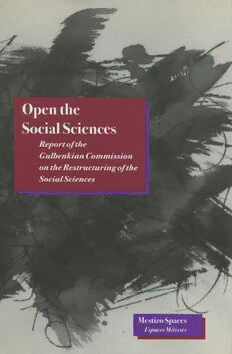
Open the Social Sciences: Report of the Gulbenkian Commission on the Restructuring of the Social Sciences PDF
Preview Open the Social Sciences: Report of the Gulbenkian Commission on the Restructuring of the Social Sciences
Open the Social Sciences Report oft he Gulbenkian Commission on the Restructuring oft he Social Sciences Stanford University Press Stanford, California © Igg6 by the Board of Trustees of the Leland Stanford Junior University Printed in the United States of America CIP data appear at the end of the book Contents Foreword Calouste GulbenkianFoundation IX Members of the Commission Xlll 1. The Historical Construction of the Social Sciences, from the Eighteenth Century to I945 I n. Debates Within the Social Sciences, I945 to the Present 33 r. The Validity ofthe Distinctions among the Social Sciences ...3 6 2. The Degree to Which the Heritage Is Parochial...48 3· The Reality and Validity of the Distinction Between the "1\vo Cultures" ... 6o m. What Kind of Social Science Shall We Now Build? r. Humans and Nature ... 78 2. The State as an Analytic Building Block ... 8o 3· The Universal and the Particular ... 85 4· Objectivity ... go Conclusion: Restructuring the IV. Social Sciences 94 Foreword The Calouste Gulbenkian Foundation sponsored, in the second half of the 1g8o's, what became a first, fruitful phase of the project Portugal !WOO, generating valuable reflections about the framework for and main issues concerning the pos sible or probable trajectories of the Portuguese nation at the dawn of the twenty-first century. These thoughts and investiga tions have been published, in Portuguese, in the series "Portu gal-The Next 1\venty Years." A5; this initiative unfolded, the Foundation further sought to support reflections and endeavors on issues of a global nature and on problems whose consideration and solutions are deemed crucial to the common search by society for a better future. In this context, a survey of the social sciences and the role they per form, in terms both of the relations among the disciplines and of their relationship with the humanities and the natural sciences, seemed appropriate. The great intellectual achievements of the X FOREWORD past thirty to forty years leading to the modern study of life and to the science of complexity, the emerging need for "contex tualization" of universalisms (which urges an increasing dia logue between cultures), and the growth of university education since the late 195o's all have strongly influenced the practice of social scientists, yet left precious little room for preoccupa tions of a structural and organizational nature. In the present state of their evolution, should overcoming the existing disci plinary structure not be considered a central dilemma for the so cial sciences? The Calouste Gulbenkian Foundation thus welcomed a pro posal by Professor Immanuel Wallerstein, Director of the Fer nand Brandel Center of Binghamton University, to conduct a distinguished international group of scholars-six from the so cial sciences, two from the natural sciences, and two from the humanities-in a reflection on the present social sciences and their future. Consequently, the Gulbenkian Commission on the Restructuring of the Social Sciences was created in July 1993, with Professor Wallerstein as its chair. Its composition reflects both the depth and the wide perspective that was necessary to achieve the analysis presented in the text that follows. Open the Social Sciences is a serious, generous, and provoca tive book, which faithfully depicts the atmosphere and the vivac ity of the Gulbenkian Commission's exchanges during the two year period that followed its creation. Three plenary meetings were held: the first at the Foundation's headquarters in Lisbon in June 1994, the second at the Maison des Sciences del 'Homme in Paris in January 1995, and the third at the Fernand Brandel Center in Binghamton in April 1995. Its intellectual level is pri-
